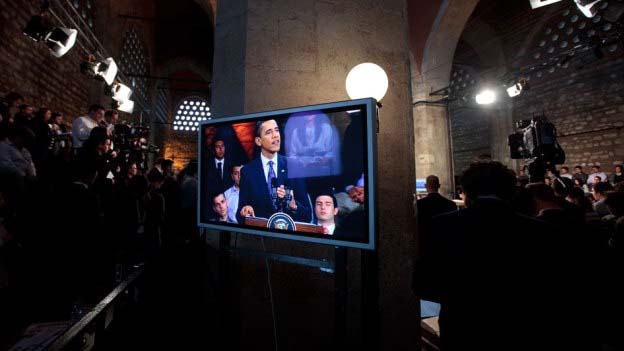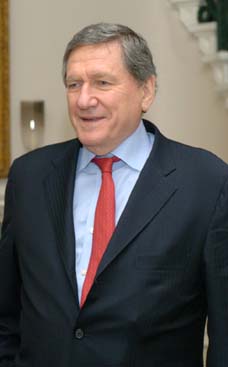
During the Bush administration, the very strong anti-American (or shall we say anti-Bush-policies) sentiments in Turkey have been an issue of deep concern for both capitals. According to Pew Center polls, America's favorability rating in Turkey in recent years has fluctuated between 9 and 12 percent, far behind Russia, Iran and Syria. According to the latest polls during the electoral campaign, skepticism toward Obama was still higher in Turkey than it was in other European countries, and relatively few Turks believed that American foreign policy would improve under the new administration. In sharp contrast with the Bush administration's preemptive diplomacy, there have been glimmers of hope for many Turks since Obama's election. The president's readiness to listen to allies and friends in world affairs, and his early decisions - pulling troops out of Iraq, closing the Guantanamo detention center, opening dialogue with Iran - are all good signs.
Utku Cakirozer writes: Turkish Hopes High for Obama's Visit
Turkish Hopes High for Obama's Visit
By Utku Cakirozer
Caption: President Barack Obama addresses his remarks at a town hall meeting Tuesday, April 7, 2009, at the Tophane Cultural Center in Istanbul. White House Photo/Chuck Kennedy
President Obama visits Turkey this weekend on his first overseas trip as U.S. president, and he sets a milestone by doing so: other U.S. presidents have always visited Ankara much later in their terms of office. This isn't a coincidence or a tiny detail. It represents a significant shift in fundamental foreign policy priorities under the new U.S. administration. I believe there are two main reasons for Obama to choose Turkey: The necessity to increase security cooperation and to reshape the global image of the United States in the aftermath of the Bush era.
Obama's presidency has put many Turks on edge, especially those in government; there's a general sense in Ankara that the more security-oriented U.S. Republican party appreciates Turkey's importance more than the Democrats do. But Obama's visit seems poised to dismiss that cliché; his pragmatism in international diplomacy, including public diplomacy, will put an early mark on his presidency as well as his administration's foreign policy.
Prior to his journey, Mr Obama underlined that his priority in foreign policy would be to deal with al-Qaeda terrorism and declared he would send more U.S. troops to Afghanistan. But his plan will only be sustainable with the contribution of his NATO allies. Turkey, on the other hand, has NATO's second-largest armed forces and has historically been a staunch ally to the U.S. in many peace and stability missions throughout the world (the only exception being the Turkish Parliament's rejection in 2003 to allow U.S. troops to invade Iraq through Turkish territory.) Since the beginning of the war in Afghanistan, Turkey has been a permanent participant of that multinational force as well. After the talks in Ankara between Obama and the Turkish leaders, one can expect a visible increase in Turkey's military and civilian presence in Afghanistan, with which Turkey had enjoyed a long history of friendly relations. Turkey can also help the U.S. in its efforts to win the hearts and minds of the Afghan people.
Turkey can also play a crucial role serving as a main logistics hub for the implementation of Obama's second priority in world affairs: Pulling the troops out of Iraq. Turkey's government is already indicating support for potential U.S. use of Incirlik Air Base and the port of Mersin.
Last year, Istanbul was the venue not only for Iranian leader Mahmoud Ahmedinejad's visit but also for the new round of peace negotiations between Israel and Syria. So President Obama will also look for ways of cooperation with Turkey to deal with Iran's nuclear program and the Middle East Peace Process.
Mr Obama's second reason to visit Turkey aims to deal with a much deeper problem. During the Bush administration, the very strong anti-American (or shall we say anti-Bush-policies) sentiments in Turkey have been an issue of deep concern for both capitals. According to Pew Center polls, America's favorability rating in Turkey in recent years has fluctuated between 9 and 12 percent, far behind Russia, Iran and Syria. According to the latest polls during the electoral campaign, skepticism toward Obama was still higher in Turkey than it was in other European countries, and relatively few Turks believed that American foreign policy would improve under the new administration.
In sharp contrast with the Bush administration's preemptive diplomacy, there have been glimmers of hope for many Turks since Obama's election. The president's readiness to listen to allies and friends in world affairs, and his early decisions - pulling troops out of Iraq, closing the Guantanamo detention center, opening dialogue with Iran - are all good signs.
But in order to leave this upsetting picture in the past and reshape the global image of his country, the president will need an ambitious public relations program in Turkey. In Ankara he will speak before the Turkish Parliament, a rare honor presented to visiting foreign leaders. In Istanbul, he will come together with young Turkish students in a meeting. Youth organizations throughout Europe, the Middle East and Asia will also participate through videoconference. He might even use the forum of the UN Alliance of Civilizations initiative (co-chaired by the Turkish and Spanish prime ministers), which will take place while he is in Istanbul, as a platform to reach out the Muslim world.
So Turkey the Muslim country he promised to visit in the first 100 days of his presidency? Officials in both capitals try to downplay this, but the fact remains that Turkey is a country with a predominantly Muslim population. But Turkey is also the only constitutionally secular Muslim nation that has for decades been anchored to the Western institutions like NATO and EU. Turkey has been a link between East and West not only geographically but also culturally and historically. And certainly Turkey has demonstrated that there is a third way through which Islam and Western style democracy can coexist despite occasional ups and downs. This is the message that President Obama ought to emphasize in his visit to Turkey with global implications: that a clash of civilizations is not inevitable.
Having said that, Turkish people want to hear the president's view on where Turkey stands in the eyes of his administration. Stopping at Turkey in his tour to Europe is a clear sign that the president views this country as part of that continent, but Turks wonder whether he is willing to lobby in Europe, as one of his predecessors former president Bill Clinton did in the past, on behalf of Turkey's most important political project: accession to the European Union. They also want to see Obama stand by their side in their struggle against terrorism. They want to see trust, partnership and confidence re-established in U.S.-Turkish relations. They want to see the new president take the lead in restoring peace, security and prosperity in the region they call home.
Utku Cakirozer is a reporter for the Turkish newspaper Milliyet and a Hubert Humphrey Fellow at the University of Maryland.











